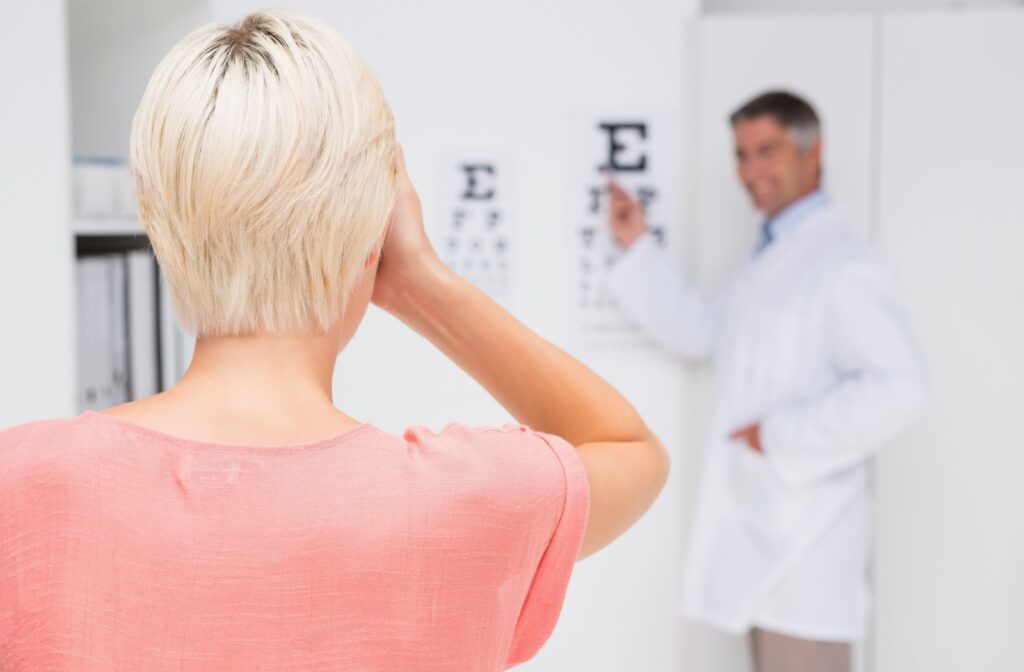Evaluating the quality of your vision includes more than just a finalized vision prescription. Take visual acuity, for example. It’s a ratio representing how sharp your vision is at a specific distance.
20/30 vision deviates just slightly below the 20/20 threshold for “perfect” or normal vision. Many people with 20/30 vision function just fine without corrective lenses, while others prefer the visual sharpness and comfort eyeglasses provide. The choice is up to you!
Choosing to wear eyeglasses with 20/30 vision largely depends on your visual needs, lifestyle, and comfort. If you’re ever unsure, your optometrist is always here to help!
What Is 20/30 Vision?
You might remember smiling from ear to ear, hearing from your optometrist, “You have 20/20 vision” after an eye exam, and boasting about it the next day during school as a child. However, not many are familiar with what this metric means.
The term “20/30 vision” refers to your visual acuity. Visual acuity represents a ratio of how sharp your vision is at a specific distance, usually tested using the classic Snellen Chart at 20 feet away.
20/20 vision is the gold standard when it comes to visual sharpness.
Having 20/20 vision means you can see details at 20 feet that a person with normal eyesight also sees at 20 feet. With 20/30 vision, you need to stand 20 feet away to see something that a person with normal vision could see clearly from 30 feet away.
This slight difference in distance may not appear significant, but it does indicate that your vision isn’t delivering full clarity. Less-than-perfect visual clarity could result from refractive errors (astigmatism or myopia) or other factors. We can only tell with a routine eye exam.
While 20/30 vision is less sharp than the gold standard, it doesn’t necessarily mean poor vision. In most cases, 20/30 vision is well within a normal, healthy range.
How Do You Know if You Need Glasses?
It’s not set in stone whether you need glasses for 20/30 vision.
It varies from person to person, largely depending on visual demands and how your eyes feel throughout the day.
If your 20/30 vision isn’t causing discomfort or hindering your daily routine, you can get by without corrective lenses. Maybe your vision doesn’t feel particularly distorted, and you’re not having any uncomfortable symptoms (eye strain, headaches), and just prefer having sharp, clear vision.
No matter your case, the choice is always yours. If you’re ever unsure, your optometrist can offer guidance.
With that said, it might be time for corrective lenses if you’re experiencing any of these concerns:
- Difficulty reading: Challenges while trying to read print, texts on your phone or digital screens, or even street signs while driving can be resolved with glasses.
- Eye strain: Focusing on work, whether manual or on digital screens, forces your eyes to overwork, leading to eye fatigue and eye strain. Even a light prescription can make a difference in your overall comfort.
- Driving: Poor visual clarity makes it harder to see road signs or see in low-light conditions, and increases visual disruptions from glare and haloes.
- Work demands: Certain professions (pilots, bus drivers, surgeons) demand exceptional visual precision. Corrective lenses help meet certain vision standards.
- Progressive vision concerns: If another eye exam shows that your vision has shifted from 20/30 to 20/40 or worse, glasses might be recommended to prevent further strain.

How to Correct 20/30 Vision
Glasses are a tried-and-true method for correcting most visual concerns, but not everyone prefers their look and feel. Luckily, there are a few other options you can consider if you’re ready to seek clarity beyond your current 20/30 vision.
Contact Lenses
Contacts deliver the benefits of prescription eyewear without the physical appearance of frames.
Available in several types, these thin devices rest comfortably on the eye’s corneal surface, offering a more natural field of vision.
However, they require more maintenance and care than eyeglasses, including annual contact lens exams and fittings.
Refractive Surgery
Laser surgeries like LASIK or PRK may help people with mild vision impairments achieve 20/20 vision or better. However, they cannot always eliminate the need for corrective lenses altogether.
An in-depth consultation can determine whether this option is right for you.
Managing 20/30 Vision Without Corrective Lenses
Eyeglasses are optional with 20/30 vision, but you can still support your vision and overall eye health without corrective lenses. Here’s how:
Protect Your Eyes from Strain
Our lives revolve around digital screens, 1 of the leading sources of eye strain. Focusing on tasks for long periods forces your eyes to overwork when they shouldn’t have to.
Following the 20-20-20 rule can help. Every 20 minutes, look at something 20 feet away for 20 seconds.
Maintain a Balanced Diet
A balanced diet of colourful foods is a great way to support your vision and eyes from the inside.
Incorporate foods rich in vitamin A, omega-3 fatty acids, lutein, and zeaxanthin to nourish your eyes. Think leafy greens, carrots, sweet potatoes, and salmon for a healthy balance.
Use Adequate Lighting
Proper lighting while working or reading can prevent your eyes from overexerting themselves. Avoid dim lights or high glare. Poor lighting conditions can further strain your vision.
Schedule Regular Eye Exams
Even if you’re managing well with 20/30 vision, everyone can benefit from routine eye exams.
With routine visits, your eye doctor can spot early signs of conditions that can harm your vision, like glaucoma or macular degeneration, before they progress. Timely intervention can offer better results.
Empower Your Vision
The deciding factor in whether you need glasses with 20/30 vision depends on your daily comfort, visual needs, and lifestyle. For some, corrective lenses can make a world of difference in clarity, while others can manage just fine without them.
A discussion with your optometrist can help outline your options. At Vancouver Block Optometrists, our team is always here to offer the guidance you need.
Connect with our team today to book your routine eye exam.

